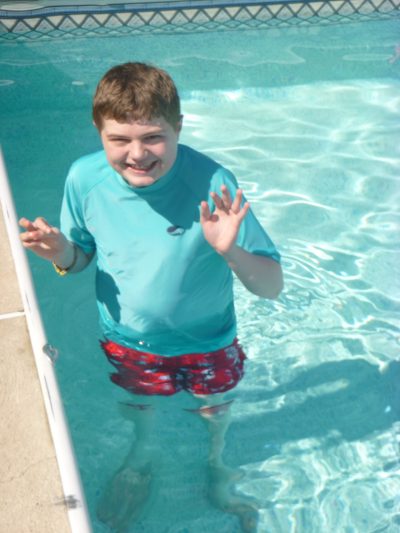
I see you, across the fairly empty waiting room at CHOP. You are with your adult daughter in a wheelchair, and she is parked next to you, silent and solemn. I watch you brush a tendril of hair out of her face and sit back in your own chair, slightly slouched over as you wait. I am close enough to see those telltale purple smudges under your eyes, your sleepless badges that so many of us with severely disabled children wear every day. Our eyes don’t cross paths, and soon your daughter is called to her appointment. You wearily stand and wheel her over to the double doors that beckon her. In a few moments, you are both gone.
You looked so, so tired. I get it. I wish I’d said something encouraging to you before you left.
This summer I took Justin to the beach one afternoon, a rather risky venture given his movement disorder and how difficult he’d been since the spring, but we live minutes from the shore and I didn’t want him to miss out on something he will at least participate in for an hour or so. He was content to run back and forth in the shallow surf a few times, was happy playing with the few toys I could schlep to the beach. Just as I was thinking of calling it a victory and a day he got up with his favorite toy in hand, and made a mad dash for the shoreline.
|
|
I know that favorite toy, the irreplaceable ancient one, is in serious danger. I heave my middle-aged body out of my beach chair and run as fast as I can toward my son, able to grab the toy in mid-arc from his outstretched hand, hoping he wouldn’t respond with a pinch in his displeasure. He let me save his toy and splashed into the water up to his knees with me close behind. Another victory.
I take them where I can get them.
A minute later he backs up out of the water, still content to let the waves lap over his toes. I breathe a sigh of relief, and realize a woman is standing next to me, smiling.
I take my eyes from Justin for a moment and smile back. I can’t count how many times we’ve been out in the community and people have come up to me to ask questions about Justin. I’d love to tell you that I’m up for it, but today (and for the last year) I’ve been really, really tired, and I’m just not feeling the autism ambassador thing.
And for once, there’s no need for me to educate.
She introduces herself and says she’s the mom of a severely autistic teenager, and a special education teacher as well. She tells me how handsome Justin is, and how great it is that I can take him to the beach. She says she doesn’t want to take too much of my time, but she wanted to tell me I was doing a great job with him, and to be proud.
To tell you the truth, as we’ve been desperately trying to help Justin I haven’t felt proud of my parenting skills for the better part of a year as I’ve watched him suffer. Her words loosen a tension in my chest, make me acknowledge what I’m trying to do, what I have been able to do for him.
I needed to hear those words, and I needed to hear them from a stranger. I feel better as I watch Justin dance once more with the waves.
I feel the return of the tendrils of hope.
I thank the woman profusely and tell her how much I needed to hear those words from someone outside of our circle, an impartial observer. I tell her how he’s struggled the past year and that I hope we’re closing in on some treatments to help him. I thank her again for making the effort.
I breathe.
Families raising severely disabled children face so much difficulty on a daily basis. Our children often exhibit aggression, insomnia, eating disorders, toileting issues, self-injurious behavior, and so many other challenges. For our family personally Justin’s behaviors come and go in cycles, and the past year has been particularly daunting. There have been many days recently where literally everything from getting him out of bed in the morning to getting him down at night has been exceedingly difficult. Some days, I didn’t know how we’d make it through to nightfall without losing our sanity. I’d beat myself up over his regressions, feeling like I wasn’t doing enough for him to help end his suffering. I know I need to let that guilt go, as it isn’t helping me, and more importantly, it’s not helping him.
The truth is, I was doing the best I could. We all are.
And sometimes that has to be enough.
For more on my family visit my blog at autismmommytherapist.wordpress.com
Follow me on Facebook at Autism Mommy-Therapist











